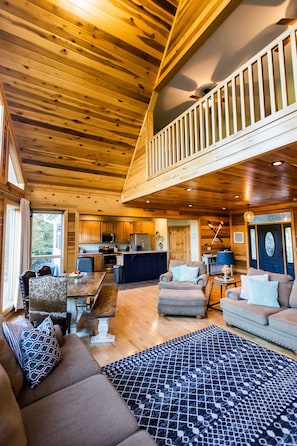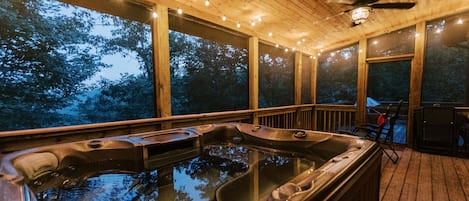Beautiful Lakefront/Riverfront property on crystal clear Lake Lahusage, this is the final property sitting against the Original stone lock and dam of Lake Lahusage, hear the waterfall constantly, view the river and the LAKE, fish for trout, bass, bream and canoe from our private dock. Soak up the views and Bask from the hottub overlooking the lake. Enjoy the views from a multi tiered deck on the back of the cabin or from inside from the multitude of windows. Enjoy a fully stocked kitchen and flat screened TV's, with new furniture and appliances and comfortable beds and linens. Master Bedroom on the main floor. Hardwood floors and uniquely designed rustic interior will provide a comfortable stay for your family!
Please visit this link for a vast history of not only our Lake Lahusage
but Mentone and the entire Lookout Mountain area.
Below is a 1964 newspaper article about the hotel that was never finished at Lake Lahusage.
Floridians find lookout mountain plateau to be ideal summer place.
By Helen Buffington (1964)
At the junction of two rivers on lookout mountain 15 miles west of Summerville stands a half finished hull of a hotel that has fascinated visitors for nearly 40 years. The skeleton of rock and tile, a nearby dam and a scenic lake are all that remain of a dream which flowered during the ebullient 1920s. The Lookout Mountain plateau which straddles the Georgia-Alabama line, with Dekalb county , Alabama on one side and Chattooga County , Georgia on the other, had been discovered by a number of Floridians as the ideal spot for a summer home. In addition to the cool breezes and lovely scenery, the plateau was blessed with three rivers--two small ones known simply as “Fer” and “Near” and Little River (sometimes known as “middle”) which the two formed. It was at this confluence of the rivers that J.B. Pounds, a Florida banker who had a summer home on the mountain, proposed to build a hotel. He interested other investors and the project got underway in 1925. A dam, with a road across the top, was built first. It would create the lake and provide the best access to the site where the hotel was to be built. Oldtimer Louis Tate, who operates a restaurant atop the mountain, says engineers had decided it would take a year for the dam to fill. But heavy rains came shortly after the dam was finished and it was washed downstream overnight. Eventually, the dam was rebuilt and erection of the 200-room hotel got underway a year later. About 300 men were involved in the project, according to Chattooga Countians who worked there. Some boarded in an old mine commissary building a mile west of the hotel site. A coal mine had been in operation there about the turn of the century, says L.P. (Sonny) Woods, Cloudland merchant, with coal cars being routed across Little River and down a rail incline to the valley’s TAG Railroad . It was this mine which gave the lake its name--Lake LaHousage, says Mr. Wood. The mine founders were Lake, House and Sage. The name of the hotel apparently hadn’t been announced, but Mr. Wood says he believes it would have been Hotel LaHousage. Pink and gray mountain sandstone, terra cotta brick, concrete and steel were used in the construction. There was a stone foundation and stone columns were used for the big front porch. The hotel was to have electric heat and its water was from a nearby well. Bath and electrical fixtures had been installed in much of the building, the roof was on and the work “could have been finished in six weeks,” says Lyerly’s Walt Smith who had the plastering contract. Then the blow came. Florida suffered an economic depression and Mr. Pounds and his group were caught in it. They could not meet the payroll and the workers left. Then the depression of 1929 came and crushed all hopes of resuming the project. The Fred McNews occupied the second floor of the building for seven years and Mrs. McNew, who now lives in Kinnard, Florida, recalls both happy and tragic moments in the old hotel. “We met a lot of nice people while there,” she says. “We had lots of visitors on Sundays and the holidays. I remember one day an old man had an icebox and sold cold drinks there.” Mrs. McNew recalls that her first granddaughter was born in the hotel. None of the rooms were really complete, she says, and, in fact, the electricity wasn’t on until the old Civilian Conservation Corps camped there for a time and turned it on. She said the CCC, a product of the depression, improved mountain roads. In the meantime, efforts by the Florida group to get the hotel finished failed. After extensive court litigation, the property was auctioned in a bankruptcy sale to two Rome men… Ten years ago, Jack Jones, a Florida businessman, bought the site, along with other property on the mountain. During the past fifteen years, many summer homes have been built in the area--a total of some 45, and the plateau has prospered. But the old hotel has continued to crumble. Windows were broken out by vandals and thieves had taken away everything which could be pried loose. Then, eight years ago the structure was ravaged by fire. Mr. Jones, the owner, says a group is still interested in building a two-story motel on the old hotel’s base. He emphasized that this is merely in the talking stage and that there is nothing at all definite.“It can be done, however,” he says flatly. In the meantime, the old hotel peers out between the trees and across her litter-strewn yard somewhat like an old recluse who fell short of attaining her dreams of wealth and beauty.
End of newspaper article.
MENTONE
Lookout and Sand Mountains are the southern extremities of the venerable Appalachian Range. This range was once as grand as the European Alps or
the Rocky Mountains; however, the Appalachians are millions of years older, and, consequently, have been eroded to their present size and configuration.
On the western brow of Lookout Mountain, overlooking the sweeping valley below, is Mentone, once a fashionable and popular vacation retreat. Two of the large and once bustling old hotels remain as silent and nostalgic reminders of a time when the "summer people" came in throngs by train to Valley Head, and were carried by horse-drawn carriages, and later by automobiles, to these hotels or to their summer homes where they could rest or play in a pleasant atmosphere.
Mentone was founded by John Mason, a native of New York City, who, as a young man, joined the United States Cavalry and was sent to the Middle West. His parents were interested in the opening of the Oregon territory, but they were city people, comfortably well-to-do, and did not care to face the hardships of a transcontinental trip by wagon and so, instead, they set sail from New York planning to reach Oregon by ship around Cape Horn. Young John expected to join his family later in Oregon, but he received the news that the ship and passengers had been lost, which was the fate of many vessels rounding the treacherous cape.
John Mason decided to remain in the Middle West and settle in Iowa. He proved to be a good businessman, and in time became moderately wealthy. During this period, however, his health began to fail, and believing in the curative value of fresh air and pure water, he traveled extensively to find these resources, and eventually reached Lookout Mountain about twelve miles north of what is now Mentone. He remained there several months, was restored to good health and returned to Iowa. His health began to fail again, so he returned to the mountain and once more regained his strength. Whereupon he traveled back to Iowa, sold his holdings and returned to Lookout Mountain with his family in 1870. He settled in the area of Moon Lake and lived there until his death at the age of 92 in 1911.
Mason wanted others to enjoy the benefits of mountain life and was instrumental in bringing in settlers from distant places. He would tell the newcomers, "Do not come with the expectation of making a fortune, but if your fortune is already made, it is the most wonderful place in the world to live."
Among these early settlers was Dr. John E. Purdon, a retired British Army Surgeon. Dr. Purdon, in turn, encouraged young Englishmen to come and live with him while he taught them how to farm. At least three young men did come, but the venture failed because of one flaw in Dr. Purdon's plan: he knew nothing about farming.
The Purdons lived across the DeSoto River (the West Fork of Little River) from the Masons and were later joined by relatives, the Thomas F. Sproules, a titled Irish family driven out of Ireland during an uprising. The Purdons left Mentone, but the Sproules lived out their lives there and received an annual income from the revenues of their Irish home.
Others came from Maine, among them: Mr. and Mrs. Horatio Libby and their son Ralph, Mr. and Mrs. Alvares Tylers and Gene Tyler. All of these remained except the Alvares Tylers.
Edward Mason was the eldest son of John Mason. His father owned many acres of land all around Mentone so Edward decided to survey streets, name them and build a summer resort. Frank Caldwell came from Ohio, it is thought, to investigate Edward's plans for the building of a hotel on the brow of the mountain. He found the plans quite feasible, and the hotel construction was soon begun. Mentone means "Musical Mountain Spring".We Love Mentone and have multiple cabins here! See our other listings and comments and ratings so that you feel comfortable renting our newest addition! VRBO numbers-
666662, 480579, 1217444, 978404, 778417, 979224






